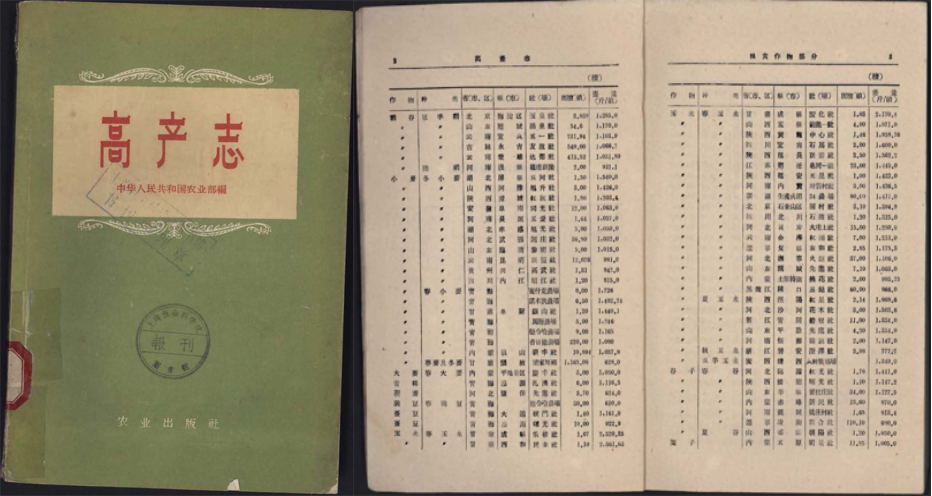Gazetteer of Extraordinary Output (1957)
Gazetteer of Extraordinary Output (1957)
1957 was remarkable in terms of the drastic influence that its happenings would cast on Chinese politics and economy. It was the year of Rectification Campaign [整风], and Anti-Rightist Movement [反右]. And the same year also witnessed the inauguration of the second Five-Year Plan [五年计划], which would eventually lead Chinese economy into a disastrous journey, widely known as the Great Leap Forward [大跃进]. The initiative of such movement started to take form around the conclusion of a nationwide debate over the official line of development between the radicals and the moderates within the Party. As the result, Mao Zedong, who had grown increasing dissatisfied with his perceived conservativism [保守主义], decided to curb the illness of “opposing incautious advance” [反冒进] in economic area. Zhou Enlai, the leading figure of the moderate camp, thus had given up his stand, giving way to a fever of “greater-and-faster” [多、快] manner to develop socialist economy. This move finally put Great Leap Forward in its place, whose inauguration was signaled by a commentary on People’s Daily.[1]
As for rural China, socialist transformation was brought to an unprecedented degree of success by the end of 1957. Ninety percentage of rural population had already been organized under advanced cooperatives [高级合作社], although the excessively rapid pace of achieving so caused a great deal of discontent, as well as widespread resistance. However, in the same year, a blueprint of agricultural development between 1956 and 1967[一九五六年到一九六七年全国农业发展纲要], passed by the CCP Central Committee, implied a much more radical move to take place for the year to come.[2]
Such is the grand context of history where the Gazetteer of Extraordinary Output, 1957 [高产志, GEO] was given birth. GEO is one of the three gazetteers that the Ministry of Agriculture [中华人民共和国农业部] compiled between 1957 and 1960. Each of those was released to showcase the outstanding productivity that was made possible through the cooperative movement [合作化] and socialist revolution of political thinking [政治思想上的社会主义革命], along with the purpose to disseminate the advanced experiences of farming. The 1957 volume, for example, is comprised of four sections, concentrating respectively on the four major categories of farming product: (1) main crop, (2) cash crop, (3) oil crop, and (4) stock-breeding. Heading each section is a list that contains a large number of selected cooperatives across the country, whose outputs of specific crop broke the national records. And most pages of the book are provided for those role-model cooperatives to share their farming experiences that led to such high outputs. Through the statistics that cover a wide range of locations, GEO may give one a clearer sense of the “Wind of Exaggeration” [浮夸风] at its infant stage. The figures listed are still very much “moderate,” compared to common cases when the Leap Forward was carried to an extreme. But they are already hardly reliable as an objective reflection of what’s going on back then.
However, the true value of the Gazetteer lies in the fact that it is representative of the widespread pattern of political behavior among rural cadres, and more importantly, of the interaction between local bureaucratic behavior and central ideological line under the socialist system of control. For instance, the recorded local farming experiences almost unanimously unfold with a similar structure, namely, what had been specified by the agricultural blueprint [农业发展纲要] as “eight-character constitution” [八字宪法]: water conservancy [水], fertilizer [肥], improving soil [土], good seed [种], intensively planted [密], removing insect-and-disease damage [害], improving instrument [工], field management [管]. This reveals, thus, more of a local following-up of central dictation rather than of specific experience from the grass-root. And the fact that majority of those experiences are directly provided by provincial bureau of agriculture also says much (though implicitly) about the primary actors to promote and radicalize agricultural policies for people’s communization movement [人民公社化运动] in 1958. Another noteworthy part is a lengthy showcase of “method of leadership” [领导方法] in various role-model counties and cities. That provides researchers with more representative, yet qualitative understanding of local governments’ way to organize farming in the period of planned economy.
Sources:
高产志(一九五七)/ 中华人民共和国农业部编 — 北京:农业出版社, 1958年7月
[1] 建设社会主义农村的伟大纲领/人民日报,1957.10.27
[2] 一九五六年到一九六七年全国农业发展纲要(修正草案)/中共中央委员会,1957.10.25
Wang Mingde
